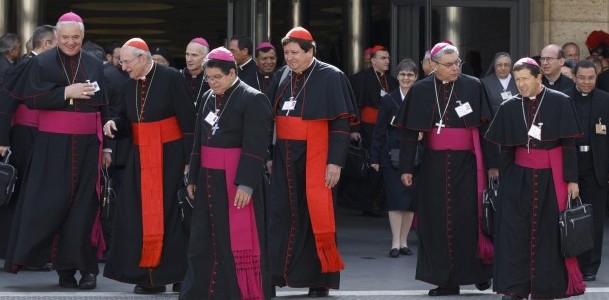After a full week of sessions in the General Assembly of the 13th Ordinary Synod of Bishops, most of the official interventions have been shared. They are scheduled to wrap up by the end of the day on Tuesday. It has been an exciting, though mentally exhausting period, as each of the Synod Fathers is allotted five minutes to speak about the New Evangelization on behalf of themselves, their episcopal conference, and their country.
It is fascinating to hear about the wide range of issues affecting the Catholic family in different parts of the world, but it is equally fascinating, as Cardinal Timothy Dolan, Archbishop of New York said Monday during an official press conference, that there are a surprising number of converging experiences being shared in the hall that bridge otherwise distant social and cultural realities.
Every continent, for example, seems to be dealing with the growing reality of secularism at some level. Whether it is a devastating "tsunami", as Cardinal Wuerl called it, or a lesser reality compared to the practical ministerial needs (including educational resources) in many African countries, for example, we are all affected in some way by this fundamental shift.
There seems to be significant levels of agreement as to what some of the solutions might be. There has been a strong push from many bishops to adopt a self-reflective, open mentality regarding their own religious experiences. The phrase "heart speaks to heart" has been used on multiple occasions. A substantial number of bishops have spoken about the need to renew parish communities, which are consistently upheld as the necessary point of encounter with the Catholic community. Allocating substantial resources for formation and other pastoral programs, recognizing the co-responsibility of the laity as evangelizers, and emphasizing the sacramental life of the church are just some of the initiatives being put forward. Evangelization of individuals
and entire cultures, it is believed, should begin at the grassroots level.
With each of these points, we can look for the underlying theme that serves to clarify the discussion. To me, there is one that jumps out immediately. The Second Vatican Council magnificently articulated the reality of the Church, and the distinct though complementary roles among the people of God. In
Christus Dominus, which is the decree on the pastoral office of the bishops, we see that each diocese, "constitutes a particular church in which the one, holy, catholic, and apostolic Church of Christ is truly present and operative." (Chap. 2, 11)
This is the foundational ecclesiology for such grassroots renewal. Now, it is important here to note that this teaching clashes with the secular view of the Catholic Church, which sees the Church as embodied instead in the office of the Pope and the Roman Curia. But it is even more important, I would argue, that we Catholics acknowledge our tendency to think in the same way, and thus miss the great insight of the Council into diocesan, and by extension parish level Christian living, which brings Jesus face to face with the modern man and woman of today. We will have to wait and see if this theme develops in the coming weeks of the Synod.
---
Photo courtesy of Catholic News Service
